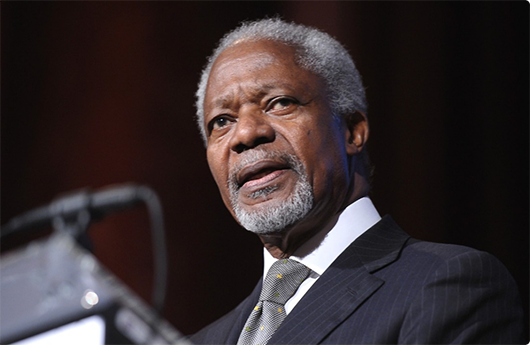
Kofi Annan
Former UN Secretary General
In 2013, a United Nations report estimated that the cocaine trade through West Africa was worth at least $1.25 billion a year. This is higher than the combined government budgets of several countries in the region, which has become an important transhipment point between Latin America producers and consumers in the United States and Europe.
This cash flow threatens to corrode the institutions of the state and undermine economic progress and democratic practice in a part of the world that has only recently emerged from several decades of violent conflict and instability.
The region’s political and security institutions are struggling to respond to these threats and are not always well equipped to mount adequate preventive measures. The “war on drugs” strategy, which focuses heavily on the suppression of drug shipments, has not enabled West Africa—or indeed other regions of the world—to meet and overcome the drug threat.
Experience has shown that force alone cannot reduce the drug supply or the criminality and corruption that it induces.
Governments that focus on drug users and small-time dealers often create an unsustainable burden on their criminal justice systems while ignoring the health and social problems that have emerged with increasing levels of trafficking, consumption, and production, which goes on unabated.
By 2013, the situation had become so alarming that I decided to convene the West Africa Commission on Drugs (WACD), chaired by former Nigerian President Olusegun Obasanjo, with a membership of distinguished West Africans drawn from diverse sectors of society.
The Commission concluded that the current policies are not only ineffective but actually detrimental to the efforts being made to contain the threats that drugs pose. It also reported that the drugs were not just in transit in the region, but increasingly available to and consumed by the local populations. For instance, the use of cocaine, in one form or another, is on the rise, particularly among young people.
Drug users need help, not punishment. That is why we recommended to treat drug use primarily as a public health issue and to focus on punitive actions towards big-time traffickers and their accomplices, who have mostly remained untouched.
Education, treatment, and decriminalization will serve our societies much more than the continued refusal to see the harmful impact drugs have on the health and wellbeing of our people. In the first place it is West African governments and their peoples that have to deal with this crisis. But Europe and the United States, which are the main market for the drugs transiting through our region, must also share the burden. The Ebola crisis, for example, has shown that supporting West Africa’s health infrastructure is in everybody’s interest.
As I have maintained in the past, drugs may have destroyed many people, but wrong governmental policies have destroyed many more. Let us not repeat this mistake.
We cannot expect governments to solve all problems on their own. Civil society must also be closely involved as well as the international community, which cannot leave West Africa alone to tackle this menace. It too must play its part.
State institutions, civil societies, and regional organizations must all work together for the maintenance of peace and stability in the region.
Source: vice.com























